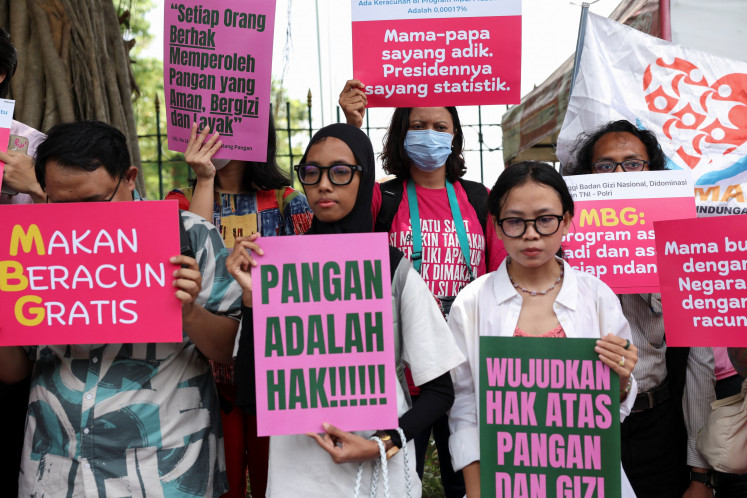Popular Reads
Top Results
Can't find what you're looking for?
View all search resultsPopular Reads
Top Results
Can't find what you're looking for?
View all search resultsWhy are women scapegoated in cases of infertility?
About one-third of fertility issues are dominated by men, one-third by women and one-third are unknown causes (unexplained).
Change text size
Gift Premium Articles
to Anyone
 Extra prenatal care: Although it is recommended to postpone pregnancy during the COVID-19 pandemic, being pregnant is everyone’s right. Unplanned pregnancies, as well as fertility programs for those with an infertility background, should be tended to with extra precautions for the sake of health and safety. (Shutterstock/Eggeegg)
Extra prenatal care: Although it is recommended to postpone pregnancy during the COVID-19 pandemic, being pregnant is everyone’s right. Unplanned pregnancies, as well as fertility programs for those with an infertility background, should be tended to with extra precautions for the sake of health and safety. (Shutterstock/Eggeegg)
T
he World Health Organization has clinically defined infertility as the failure to achieve pregnancy after 12 months of regular sexual intercourse, a minimum of two to three times a week, without the use of contraception.
Infertility is not a new issue in reproductive treatment. However, in recent years, the discussion on infertility has developed quite dynamically around the world. A WHO report estimates that 8 to 10 percent of couples globally deal with infertility cases, or about 50 to 80 million couples.
In Indonesia, out of 67 million couples during their productive age, 10 to 15 percent or 8 million couples experienced infertility or had fertility issues that made it difficult for them to have children (Indonesia Health Profile, 2012). According to Statistics Indonesia, the prevalence rate of infertility in the country is increasing every year. In 2013, the prevalence rate was at 15 to 25 percent among all couples.
Unfortunately, women are often the ones to blame when talking about infertility. Both parties (husband and wife) contribute to the success of having a child. About one-third of fertility issues are dominated by men, one-third by women and one-third are unknown causes (unexplained).
Argyo Demartoto, in a gender perspective study The Impact of Infertility on Marriage (2008), states that the value of having children in Indonesian culture and society is very important, especially in a household.
Men are identified as stronger than women. Children are the symbol of a male’s virility, strength and sexual capacity. This perception, which comes as a result of the social construct of their gender identity, makes a man feel inferior when they do not have a child, so they blame the woman. In a dominant patriarchal culture, when the issue of infertility arises, women are often blamed for their capacity to be pregnant. This stigma sometimes ends in an unfair situation for women, even leading to physical abuse.
The results of Argyo’s study, for example, cited a case in Banjarsari, Surakarta, where there was gender discrimination in which men blamed women as a reason for divorce.
Research published in the journal Reproductive Health (2019) found that in many low- and middle-income African countries, women with fertility issues are often forced to accept a polygamous marriage. In Pakistan, infertility is a critical condition that affects the social and marital life of couples. Compared to fertile women, women who experience fertility issues are twice as vulnerable to domestic violence.
The same is found in Iran. From 200 infertile women, 136 (68 percent) reported a history of physical abuse, 120 (60 percent) had experienced sexual abuse and 140 (70 percent) had experienced psychological abuse. There is a significant connection between infertility and physical, sexual and psychological abuse.
Infertility is not the only issue for women in modern medical research. Compared to the number of guidelines written for women experiencing infertility, the number of independent journals written for men is still very limited.
Likewise, scientific research on the emotional impact of the diagnosis and treatment of infertility in men is still limited.
Maybe this is because, from the beginning, men and women have to deal with acceptance in different ways. In an American study, nearly 50 percent of women and only 15 percent of men consider infertility an uncomfortable condition in their lives.
Other research shows that even in developed countries like the United States, 81 percent of government-funded clinics provide education about preconception care for women. In contrast, only 38 percent of clinics provide similar education for men.
These factors make infertility testing unequal. Most couples do not get enough treatment because they are embarrassed to undergo a medical check, and there is even an initial assumption that women are infertile. Even if the examination is finally carried out, women sometimes have more prolonged and more painful infertility tests than men.
Research by Kevin Y. Chu from the Department of Urology at the University of Miami also found that women seek medical help and perform reproductive health evaluations faster than men.
Infertility has psychological implications, especially for women. The source of the sociopsychological pressure on women is closely related to their deterministic nature to conceive and deliver a baby.
As such, it is time that infertility should be considered not only a medical or psychological issue, but also a social issue. Moreover, infertility treatment puts a strain on physical, mental, and emotional pain. Infertile couples struggle with stress and stigma from society, especially for women.
Support needs to be given to women who have infertility issues so that they can still be empowered (women’s empowerment). Infertility is not the end of a woman’s life. Infertility can be treated, ranging from simple methods such as lifestyle modification to more sophisticated methods with assisted reproductive technologies such as insemination and in vitro fertilization (IVF).
The process of treating infertility is not an easy journey. This long journey is like a roller coaster ride for the couple who is on it, especially if the issue is with the woman. There are feelings of hope mixed with anxiety, fear and even the risk of depression because there is always the possibility of failure. Availability of accurate, reliable information and support should be provided.
Every family has the right to have children, based on their choice. Everyone can start to spread the word. Relevant medical associations, as well as the health industry engaged in this field, can provide support to the government in providing access to information (increasing awareness), education on reproductive health, infertility and its treatment and opportunities to create a happy family.
***
President director of PT Merck Tbk. The views expressed are her own.









